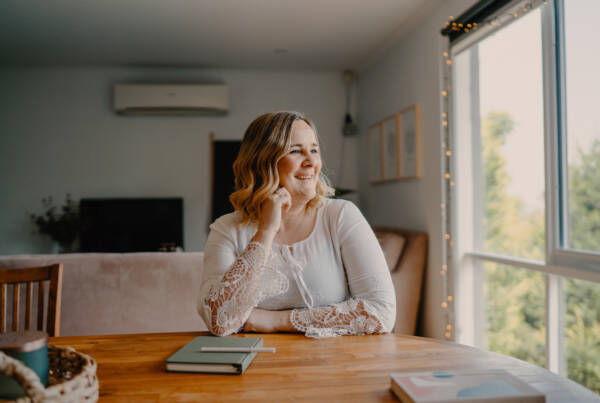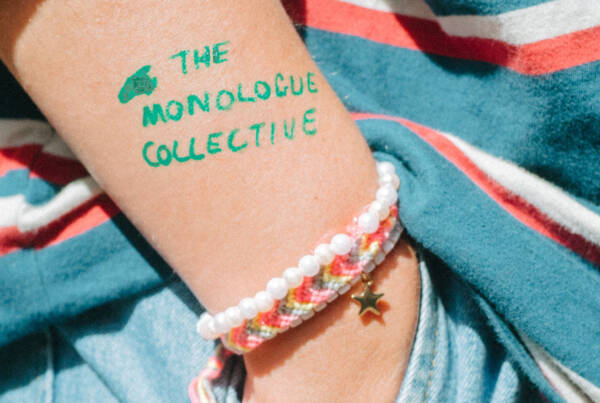Interview of Mandi and Kelsey by Darcy Clifford // The stronger your self-love, the more love and support you will have for others. When you feel strong, your strength will shine out onto them. When you feel love (even from yourself), that love will flow from your heart to theirs.
Interview of Mandi and Kelsey by Darcy Clifford
UR Enough is a place that embraces the vulnerabilities that make us most human; a place that celebrates individuals for exactly as they are. By revealing our vulnerabilities, UR Enough shines light onto topics such as anxiety, addiction, and pain — highlighting the qualities that make us our authentic self. Mandi and Kelsey are a team of two women that founded this platform, and this is how they celebrate your ‘enough-ness’.

The people whose stories you help to share have often had extremely painful or traumatic experiences. Is it ever difficult or emotionally tiring for you to hear about the most distressing times of so many people’s lives? How do you deal with this, and stay focused on the positive?
Since starting UR Enough, we have encouraged others to be brave and speak their truth — the truth of how they feel and of who they are. An incredible amount of people have come forward to share their struggles, their pains, and hurdles that they have overcome. Many of these stories that we have listened to have come from complete strangers. Each story holds its own weight, but the value of each is the same. Witnessing someone in such a vulnerable state, being their authentic self, we have felt their pain, we have cried, we have shook with anger and we have been left in awe at the breadth and depth of humanity. As hard as it might be, we want to be there to listen.
As a society, we tend to avoid sharing our vulnerabilities for fear that we won’t be accepted or loved. That is a very real fear, and we want to take the time to show others that the UR Enough community understands and that they are not alone. The conversations have been hard, but we knew that would be the case when we started. We have witnessed the weight lifted from the shoulders of those strong and courageous individuals after they shared their stories, and the transformation is truly magical.
We are so grateful for this life and believe that life is an amazing gift. We do our very best to keep this mindset, but don’t think that we aren’t human and don’t have bad days. When all else fails, there is nothing that ‘90s pop music and a dance party in our kitchen won’t fix.
You and the participants in your project have mentioned how social media, despite its convenience, can negatively affect self-esteem and take some of the magic out of personal interactions. I know a lot of us see perfect photos on Instagram, curated bits of life on Facebook, or announcements of career milestones on LinkedIn and feel that we are “not good enough,” that we should be “better.” Are there any ways in which you think social media can be used beneficially—for instance, not to lower self-esteem but to raise it, or to spread love and kindness to others? What are some personal practices of your own that you use to avoid the more harmful effects of social media?
This has been a huge struggle for us. People showcase the most aspirational version of themselves on social media and although it’s human nature to compare ourselves to others, the way that we compare ourselves to others on social media is dangerous.
Technology allows us to always stay connected, but we feel more disconnected than ever. It is only going to continue to evolve and our social media presence is probably only going to grow, but what is stopping us from changing our social narrative? We started to question what life would be like if we all were actually honest on social media, showed what was real, removed the filters and the fillers, and spoke truth — truth of struggles or hurdles faced, to truth of success that has given us the strength to exclaim that we are enough. With UR Enough, we are encouraging others to help us by filling our feeds with truth and inspiration. Living in the new digital age, we want to break the silence together and speak about our struggles and experiences. We want to be brave enough to create a culture of acceptance and support, and spread love and kindness to others.
Behind the scenes, we know that what we are asking for does not come easy. With UR Enough being a social media platform, we too have our own daily insecurities about the pictures we post and the messages we share. It’s a constant game of tug-of-war with ourselves wanting to show our authentic and real selves while overcoming our fear of inadequacy and feelings of not being enough. When we feel those thoughts overwhelm us, we put our phones away and focus on our present selves.
How do gender norms and stereotypes (for both men and women) influence people’s reluctance to love and accept themselves or to address their mental and emotional vulnerabilities?
Girls are vulnerable, and boys are strong. Society, friends and family influence our idea of what it means to be a boy or girl and can place rigid gender expectations on us at an early age. Breaking from those typical norms, we have seen people not granted the same social acceptance because of their association to irregular gender roles. They have faced significantly more stigma and rejection in comparison to their counterparts. While we like to think we are moving in the right direction, our culture still struggles to accept and understand that we are all the same, and that causes many of us to struggle with loving and accepting ourselves. Not wanting to challenge the gender stereotypes or cross gender boundaries, we remain silent, sacrificing our own mental health and happiness. But why can’t girls be strong, and boys be vulnerable!? UR Enough wants to be at the forefront and say that they can, and those people, who are just like you or I, are worthy of the same love and acceptance.
Recovery from any trauma or painful experience is not necessarily linear; neither is learning to love yourself. Is self-love—or even just self-acceptance—something that you find needs to be continuously re-learned or reinforced? What are some of your favorite ways to deal with a stall in recovery or a dip in self-esteem?
We believe that self-acceptance and self-love is a journey that you choose daily. When you begin on this journey, you will become aware of your feelings and emotions, your faults, your quirks, and it might be an extremely uncomfortable and vulnerable experience. Choosing to love of all of yourself physically, mentally, emotionally and spiritually is a daily practice. Not all of those days will be the same; some days will be easier than others, and that is okay. While we don’t know if self-love is continually re-learned, we will say that by the choices that we make, we are impacting our view of how we see ourselves. And while we might not be able to choose the circumstance, the way that we consciously choose to react can enhance how we will move forward in our journey. Self-love is about choosing yourself every single day.
We are huge fans of self-talk. What you say to yourself can influence your self-esteem and confidence. Using positive words that provide support and encouragement precedes the mood you are in, and daily visualization and affirmations can help when you find yourself slipping into negative self-talk. Talking with a family member, friend, group therapy or therapist can also provide clarity. It isn’t until we say our thoughts and feelings out loud that they lose their weight and control over us.

It can be easy to think of self-love (and self-care) as selfish or at odds with spending time, energy, and thought on others, but the stories you share indicate that the opposite is often true. What are some ways in which self-love improves our ability to offer love and support to the people around us?
The stronger your self-love, the more love and support you will have for others. When you feel strong, your strength will shine out onto them. When you feel love (even from yourself), that love will flow from your heart to theirs. The beautiful thing about support is that it can come full circle. We are all human, forever changing, forever growing. We too will make mistakes, have flaws, and will require help from others. And that’s okay, because at one point you were able to give them the love that they needed and now they will be able to give you some of that love and support in return.
How can self-improvement coexist with self-acceptance and self-love? Can we strive to be kinder, more knowledgeable, more open, more fulfilled, etc., in a healthy way while also accepting and loving ourselves as we are?
Many people ask this question. How am I enough, but yet I should always be striving to be kinder, more knowledgeable, more ______? So let us explain this one by discussing what UR Enough means and what it doesn’t:
It does not mean that you have worked long enough, tried hard enough, presented well enough. It does not mean that you are a finished product, that you won’t grow, and forever change and learn. It does not mean you are everything, that you are self-sufficient and won’t need help. Being enough doesn’t mean you won’t make mistakes or have flaws. No. UR Enough means that you were made to be you, as you are, on purpose. And there is no mistake in that.
UR Enough as you are, mess and all, beautifully imperfect, showing up for your life every day. UR Enough means that you can grow and change and continue to become. You might want to become more honest, more true, more authentic, those are all expressions of UR Enough-ness. They aren’t about changing you, they’re about being you. You were enough before, you are enough now, and you will continue to be enough as you become more of who you were made to be.
What do you believe are the most important things we can do for others to help them know not just that they are loved by others, but also that they are worthy of their own love?
Acknowledge them, listen to them and see them for all of their worth. Letting them know through our words and actions that they matter and are worthy of love, we might provide just enough encouragement and hope that our thoughts will become contiguous.
What are some of your favorite examples of media (TV shows, movies, music, books, magazines, podcasts, etc.) that send positive messages about self-worth?
Brene Brown is one of our FAVOURITE authors. All of her books are absolutely magical. Discussing everything from vulnerability to courage, to shame and empathy, her words continue to resonate with us. Moving from one book to the next, she encourages us to embrace vulnerability and imperfection, to live wholeheartedly, and to courageously engage in our own lives.
Big Magic by Elizabeth Gilbert is another one of our favorites.
This Is Us we feel like there is a little bit of everyone in this show (be prepared to cry every episode).
It’s Not About You podcast by Felicia Baird.








